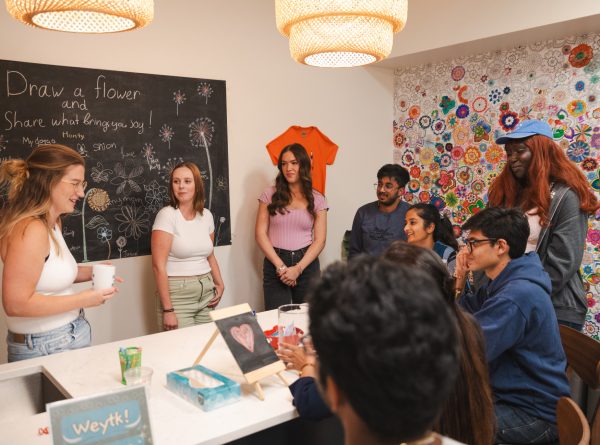Counsellor Kristin Robinson says there is no one-size-fits-all approach to love, loss, healing and recovery when coping with break-ups, loss or change. “No relationship is the same; therefore, no loss is the same. While much of my programming focuses on romantic relationships, it’s important to note that my toolkit for healing is applicable in various ways. Heartbreak often equals change, sometimes welcomed, sometimes unwelcomed — either way, it’s still a painful process that impacts your routine and general well-being, which can be particularly disruptive to student life. Whether that’s a break-up, a friendship falling apart, the death of a family member, losing a job, failing a course, feeling homesick or missing a pet — the pain can be just as acute.”
Common reactions to loss:
- Depression
- Anxiety
- Panic attacks
- Crying
- Over-working or not working at all
- Sleeping too much or not at all
- Reduced appetite or increased appetite
- Not being able to focus
- Engaging in coping mechanisms not generally in line with values or goals

Kristen Robinson meets with student storytellers in the Wellness Centre
Breakups can be painful whether you ended the relationship or your partner did; there’s also a need to consider challenges, disappointments, and other harmful elements within the relationship.
“Coping with a breakup is not just about pining for someone you loved; there can be a real need to rebuild self-esteem if the relationship caused harm emotionally, psychologically, or physically.”
Robinson says that the circumstances of the break-up impact your state of mind. “Not being the one who initiated the breakup can intensify the loss and can be a shock to the system. If this was your first serious relationship or big feelings of love, your first queer relationship, or your ex was also your best friend, that can be remarkably tender.”
She notes that constantly running into your ex, seeing your ex start dating someone else or feeling alienated by your shared friendship circle can compound the pain.
“When your romantic identity conflates with your social identity, it can feel like a double loss.
Reeling from these complex conditions isn’t all just in your head; Robinson says, “Dopamine is the hormone that keeps us engaged in an activity that benefits our survival – it feels good – it keeps us going back for more! This is highly activated during new love – texting, calling, snapchatting. Have you or one of your friends suddenly been very hard to make plans with during new love? When deep in the honeymoon phase, we want to be near each other constantly because we keep getting that reward.”
However, breaking up does not mean that those associations end along with your relationship. “It’s active even after we experience loss – keeps us seeking reward where there is not any to be seen anymore – so we have this drive to address this need and want and motivation, but it’s no longer available to us, which can leave us in this desperate, painful place.”
The break-up experience is an emotionally sophisticated loss and can trigger an animalistic, primal response (crying, panicking, being overwhelmed by the oh my god, this is so painful I’m going to DIE) feelings.
- Shock: experiencing the first reaction, not believing it, sensory overwhelm
- Denial: refusal to accept the truth of the situation
- Desperation: overwhelmed with an insatiable need to know, trying to make sense of why it did not work and struggling to comprehend that there isn’t a satisfying answer to bring you peace

The impact of these responses can all manifest in impairing your capacity for reason and judgment. Perhaps you’re trying to convince your ex-partner that things can change, begging them for another chance, promising that you will change everything to make it right even if your logical mind knows it isn’t feasible or fair. These attempts can also dip into obsessiveness, increasing the effort to contact your ex.
“The rom-com genre has taught us that persistence is the key to winning someone back when you’re actually burning through someone’s boundary. Reconciliations and reunions are possible, but an aggressive pursuit can worsen conditions internally and externally.”
“The shame spiral is real, ” Robinson says. “Those ruminations looping over and over can be agonizing and destructive, taking you further from the final stage of processing, which is hope. The good news is that the body is wired for loss, so while it’s painful, it is survivable.”
When reaching the acceptance stage, she encourages students to remember that the process is not linear: It can be waves of pain, realization, clarity, and grief, especially in conjunction with your quality of life. “If you’re not sleeping well, eating much, feeling overwhelmed with your obligations and responsibilities, it makes your emotions all the rawer – especially if your perception is that your ex is doing better than you are.”
Robinson notes that social media can be a dangerous contributor to your healing process and to your (most likely incorrect) assumptions about how your ex is coping. “It’s important to remember that social media personas are often carefully curated, and that applies to your past highlight reels about your relationship or your ex’s most recent Instagram stories.”
Fixating on your interpretation of that stylized reality increases rumination, elongates recovery time, and fuels your imagination’s fire. “It’s easy to interpret their activities online as if the other person is doing much better than you. With this device in your hand, it’s creating an inescapable access to your living loss. To help speed up the process, taking a break from someone’s social media presence after a break-up might be a good idea.”
Whatever the circumstances, Robinson insists there’s a need for self-reflection. Returning to a relationship without working on the foundational issue can lead to a second break up, or heading into a new relationship without addressing those fears and concerns can start the cycle all over again. “Our relationships should be a refuge, a safe place to be yourself – it should be fun. But if it’s making you unhappy or causing you to ignore other aspects of your individuality – such as school, work, friendships, creative endeavours and personal goals, it would be wise to strategize ways to strike a better balance with a trusted friend or counsellor.”
While break-ups are often associated with sobbing into a tub of ice cream, it’s not always about the blues. “Anger can be part of the process from the initial stages or grow into a grudge over time. You can be mad at your ex, at yourself, angry about something that has already happened, and unable to change it. Then, you can feel doubly vexed, feeling angry about being angry. A break-up is easier to handle when you’re angry. When the anger phase dissipates, numbing goes away – and often, as a counsellor like me might suggest, mad is the bodyguard of sad.”
Tools for recovery
Feel it to heal it: Ignoring or suppressing feelings can prolong the grieving process and can lead to overconsumption or misuse of alcohol, substances, sex, shopping, technology, and any other distractions (whatever keeps you from feeling your feelings). But the feelings will be there waiting for us when we get back from these distractions (which can be worsened through these attempts at self-soothing. Identify your emotions and allow yourself to experience them. “Be curious about the things that are coming up. Is this anger? Grief? Frustration? Shame? Hurt? Have a conversation with the emotions, don’t judge or police them. Just experience them,” Robinson said.
(Re) Build your community: Connect with your friends and family online and in person and book an appointment with a counsellor to construct a network outside your loss. Don’t isolate yourself or withdraw from those who can support you.
Express yourself: Writing can change the perspective and provide new insights. “Don’t edit yourself!” Robinson says, “Write the most uncensored things you want, say the things you couldn’t even share with your closest confidant.”
Plan for the future: “It’s important to remember that there’s still a lot of life to lead, and there are chances for you to find fulfilment elsewhere, beginning with yourself. Romantic or friendship loss can devastate your sense of self-worth, so you need to reconstruct confidence through creativity and connection.”
Robinson facilitates programming with Sexualized Violence and Prevention and Response and students can book an appointment with her through studentservices@tru.ca.

